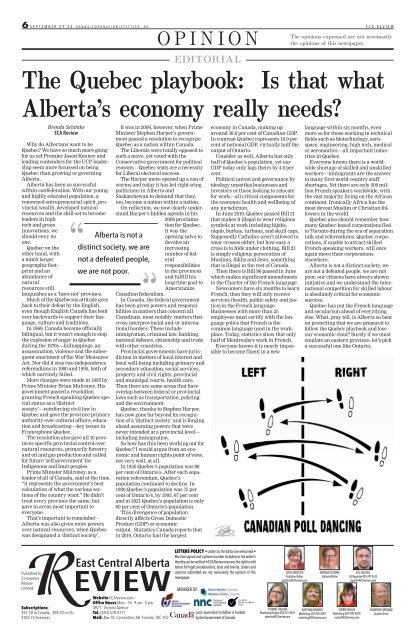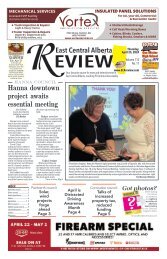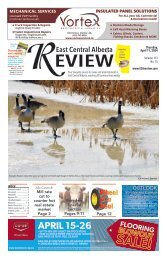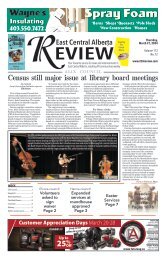ECA Review - 2022-09-29
ECA Review - 2022-09-29
ECA Review - 2022-09-29
You also want an ePaper? Increase the reach of your titles
YUMPU automatically turns print PDFs into web optimized ePapers that Google loves.
6 September <strong>29</strong>'22 HANNA/CORONATION/STETTLER, AB. <strong>ECA</strong> REVIEW<br />
OPINION<br />
The opinions expressed are not necessarily<br />
the opinions of this newspaper.<br />
<br />
R<br />
R<br />
R<br />
R<br />
R<br />
Published by<br />
Coronation<br />
<strong>Review</strong><br />
Limited<br />
Subscriptions:<br />
$52.50 in Canada; $98.70 in US;<br />
$183.75 Overseas.<br />
72 pt<br />
East Central Alberta<br />
EVIEW<br />
60 pt<br />
48 pt<br />
36 pt<br />
Website <strong>ECA</strong>review.com<br />
Office Hours Mon. - Fri. 9 am - 5 pm<br />
R<br />
30 pt<br />
4921 - Victoria Avenue<br />
Tel. (403) 578-4111<br />
R<br />
24 pt<br />
Mail: Box 70, Coronation, AB Canada, T0C 1C0<br />
EDITORIAL<br />
The Quebec playbook: Is that what<br />
Alberta’s economy really needs?<br />
Brenda Schimke<br />
<strong>ECA</strong> <strong>Review</strong><br />
Why do Albertans want to be<br />
Quebec? We have so much more going<br />
for us yet Premier Jason Kenney and<br />
leading contenders for the UCP leadership<br />
seem more focussed on being<br />
Quebec than growing or governing<br />
Alberta.<br />
Alberta has been so successful<br />
within confederation. With our young<br />
and highly educated population, a<br />
renowned entrepreneurial spirit, provincial<br />
wealth, developed natural<br />
resources and the skill-set to become<br />
leaders in high<br />
tech and green<br />
“<br />
innovations, we<br />
should envy no<br />
one.<br />
Quebec on the<br />
other hand, with<br />
a much larger<br />
geographic footprint<br />
and an<br />
abundance of<br />
natural<br />
resources still<br />
languishes as a ’have not’ province.<br />
Much of the Quebecois attitude goes<br />
back to their defeat by the English,<br />
even though English Canada has bent<br />
over backwards to support their language,<br />
culture and traditions.<br />
In 1969, Canada became officially<br />
bilingual, but it wasn’t enough to stop<br />
the explosion of anger in Quebec<br />
during the 1970s—kidnappings, an<br />
assassination, violence and the subsequent<br />
enactment of the War Measures<br />
Act. Nor did it stop two independence<br />
referendums in 1980 and 1995, both of<br />
which narrowly failed.<br />
More changes were made in 1995 by<br />
Prime Minister Brian Mulroney. His<br />
government passed a resolution<br />
granting French-speaking Quebec special<br />
status as a ‘distinct<br />
society’—reinforcing civil law in<br />
Quebec and gave the province primary<br />
authority over cultural affairs, education<br />
and broadcasting—key issues in<br />
Francophone Quebec.<br />
The resolution also gave all 10 provinces<br />
specific provincial control over<br />
natural resources, primarily forestry<br />
and oil and gas production and called<br />
for future ‘self government’ for<br />
Indigenous and Inuit peoples.<br />
Prime Minister Mulroney, as a<br />
leader of all of Canada, said at the time,<br />
“it represents the government’s best<br />
calculation of what the various sections<br />
of the country want.” He didn’t<br />
treat every province the same, but<br />
gave in areas most important to<br />
everyone.<br />
That’s important to remember –<br />
Alberta was also given more powers<br />
over natural resources, when Quebec<br />
was designated a ‘distinct society’.<br />
It was in 2006, however, when Prime<br />
Minister Stephen Harper’s government<br />
passed a resolution to recognize<br />
Quebec as a nation within Canada.<br />
The Liberals were totally opposed to<br />
such a move, yet voted with the<br />
Conservative government for political<br />
reasons—Quebec seats are a necessity<br />
for Liberal electoral success.<br />
The Harper move opened up a can of<br />
worms and today it has led right-wing<br />
politicians in Alberta and<br />
Saskatchewan to demand that they,<br />
too, become a nation within a nation.<br />
On reflection, we now clearly understand<br />
Harper’s hidden agenda in his<br />
2006 proclamation<br />
for Quebec.<br />
It was the<br />
opening salvo to<br />
devolve an<br />
increasing<br />
number of federal<br />
responsibilities<br />
to the provinces<br />
and fulfill his<br />
long-time goal to<br />
Americanize<br />
Canadian federalism.<br />
In Canada, the federal government<br />
has been given powers and responsibilities<br />
in matters that concern all<br />
Canadians, most notably matters that<br />
cross interprovincial and/or international<br />
borders. These include<br />
immigration, criminal law, banking,<br />
national defence, citizenship and trade<br />
with other countries.<br />
Provincial governments have jurisdiction<br />
in matters of local interest and<br />
local well-being including primary and<br />
secondary education, social services,<br />
property and civil rights, provincial<br />
and municipal courts, health care.<br />
Then there are some areas that have<br />
overlap between federal or provincial<br />
laws such as transportation, policing<br />
and the environment.<br />
Quebec, thanks to Stephen Harper,<br />
has now gone far beyond its recognition<br />
of a ‘distinct society’ and is forging<br />
ahead assuming powers that were<br />
never intended at a provincial level—<br />
including immigration.<br />
So how has this been working out for<br />
Quebec? I would argue from an economic<br />
and human rights point of view,<br />
not very well, at all.<br />
In 1950 Quebec’s population was 88<br />
per cent of Ontario’s. After each separation<br />
referendum, Quebec’s<br />
population continued to decline. In<br />
1980 Quebec’s population was 75 per<br />
cent of Ontario’s, by 1995, 67 per cent<br />
and in 2021 Quebec’s population is only<br />
60 per cent of Ontario’s population.<br />
This divergence of population<br />
directly affects Gross Domestic<br />
Product (GDP) or economic<br />
output. Statistics Canada reports that<br />
in 2019, Ontario had the largest<br />
Alberta is not a<br />
distinct society, we are<br />
not a defeated people,<br />
we are not poor.<br />
“<br />
LETTERS POLICY • Letters to the Editor are welcomed •<br />
Must be signed and a phone number included so the writer’s<br />
identity can be verified. • <strong>ECA</strong> <strong>Review</strong> reserves the right to edit<br />
letters for legal considerations, taste and brevity. Letters and<br />
columns submitted are not necessarily the opinion of this<br />
newspaper.<br />
MEMBER OF:<br />
economy in Canada, making up<br />
around 38.6 per cent of Canadian GDP.<br />
In contrast Quebec represents 19.9 per<br />
cent of national GDP, virtually half the<br />
output of Ontario.<br />
Consider as well, Alberta has only<br />
half of Quebec’s population, yet our<br />
GDP today only lags theirs by 4.6 per<br />
cent.<br />
Political unrest and governance by<br />
ideology unsettles businesses and<br />
investors or those looking to relocate<br />
for work—all critical components for<br />
the economic health and wellbeing of<br />
any jurisdiction.<br />
In June 2019, Quebec passed Bill 21<br />
that makes it illegal to wear religious<br />
symbols at work including hijabs,<br />
niqab, burkas, turbans, and skull caps.<br />
Supposedly Catholics aren’t allowed to<br />
wear crosses either, but how easy a<br />
cross is to hide under clothing. Bill 21<br />
is simply religious persecution of<br />
Muslims, Sikhs and Jews, something<br />
that is illegal in the rest of Canada.<br />
Then there is Bill 96 passed in June<br />
which makes significant amendments<br />
to the Charter of the French language.<br />
Newcomers have six months to learn<br />
French, then they will only receive<br />
services (health, public safety and justice)<br />
in the French language.<br />
Businesses with more than 25<br />
employees must certify with the language<br />
police that French is the<br />
common language used in the workplace.<br />
Today, statistics show that only<br />
half of Montrealers work in French.<br />
Everyone knows it is nearly impossible<br />
to become fluent in a new<br />
Local Journalism Initiative is funded<br />
by the Government of Canada.<br />
JOYCE WEBSTER<br />
Publisher/Editor<br />
publisher@<strong>ECA</strong>review.com<br />
YVONNE THULIEN<br />
Marketing/Digital 403-575-9474<br />
advertise@<strong>ECA</strong>review.com<br />
language within six months, even<br />
more so for those working in technical<br />
fields such as biotechnology, aerospace,<br />
engineering, high tech, medical<br />
or aeronautics—all important industries<br />
in Quebec.<br />
Everyone knows there is a worldwide<br />
shortage of skilled and unskilled<br />
workers—immigrants are the answer<br />
to many first-world country staff<br />
shortages. Yet there are only 300 million<br />
French speakers worldwide, with<br />
the vast majority living on the African<br />
continent. Ironically Africa has the<br />
most devout Muslim or Christian followers<br />
in the world.<br />
Quebec also should remember how<br />
many Quebec-based corporations fled<br />
to Toronto during the era of separation<br />
talk and referendums. Quebec corporations,<br />
if unable to attract skilled<br />
French-speaking workers, will once<br />
again move their corporations<br />
elsewhere.<br />
Alberta is not a distinct society, we<br />
are not a defeated people, we are not<br />
poor, our citizens have always shown<br />
initiative and we understand the international<br />
competition for skilled labour<br />
is absolutely critical for economic<br />
success.<br />
Quebec has put the French language<br />
and secularism ahead of everything<br />
else. What, pray tell, is Alberta so bent<br />
on protecting that we are prepared to<br />
follow the Quebec playbook and lose<br />
our economic clout? Surely if we must<br />
emulate an eastern province, let’s pick<br />
a successful one like Ontario.<br />
JUDY WALGENBACH<br />
Marketing 403-740-2492<br />
marketing@<strong>ECA</strong>review.com<br />
BRENDA SCHIMKE<br />
Editorial Writer<br />
SHEREE BAILLIE<br />
Marketing 587-990-4818<br />
contact@<strong>ECA</strong>review.com<br />
STU SALKELD<br />
LJI Reporter 403-741-2615<br />
reporter@<strong>ECA</strong>review.com<br />
LISA MYERS-SORTLAND<br />
Graphic Artist<br />
R<br />
18 pt


















